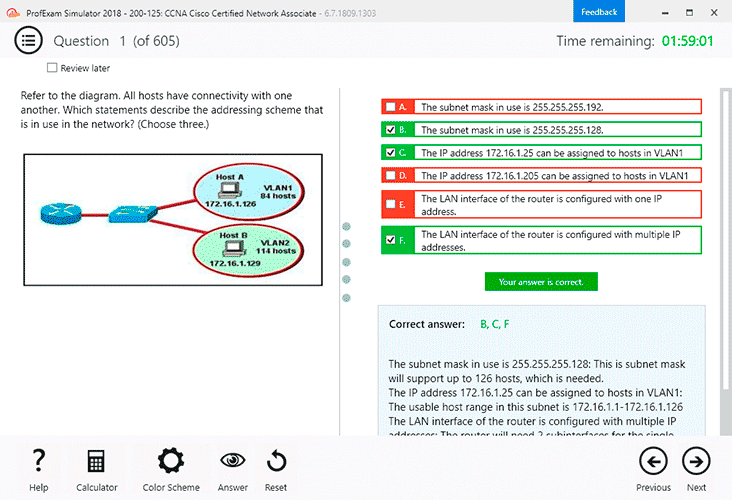File Info
| Exam | Professional Scrum Master II |
| Number | PSM II |
| File Name | Scrum.PSM II.PrepDumps.2020-10-18.180q.vcex |
| Size | 123 KB |
| Posted | Oct 18, 2020 |
| Download | Scrum.PSM II.PrepDumps.2020-10-18.180q.vcex |
How to open VCEX & EXAM Files?
Files with VCEX & EXAM extensions can be opened by ProfExam Simulator.
Coupon: MASTEREXAM
With discount: 20%





Demo Questions
Question 1
A Scrum Master is not only a servant-leader to the Scrum Team and organization, it’s also considered a management position.
Which three activities describe what a Scrum Master manages as reflected by the Scrum Guide? (Choose three.)
- Reporting on the performance of the Sprint.
- The way Scrum is understood and enacted within the organization.
- Managing the capacity and utilization of each Development Team member.
- Managing the process in which Scrum is applied.
- Managing the Product Backlog items and work in the Sprint Backlog.
- Removing organizational impediments that limits the team’s progress and productivity.
Correct answer: BDF
Explanation:
The Scrum Master must understand the principles and values behind agility as well as the Scrum theory. He/she also must act in ways that reflects the values of Scrum and creates an environment for others to also embrace those values. He/she is responsible for ensuring the team’s process stays within the boundaries of the Scrum framework as well as helping and supporting the team with continuous improvement. The Scrum Master must understand the principles and values behind agility as well as the Scrum theory. He/she also must act in ways that reflects the values of Scrum and creates an environment for others to also embrace those values. He/she is responsible for ensuring the team’s process stays within the boundaries of the Scrum framework as well as helping and supporting the team with continuous improvement.
Question 2
An organization has just hired you as a new Scrum Master to help them transition their teams from their current traditional process to Scrum. The teams are currently structured to specialize in a single function. This is also known as component teams where a team would only address a single layer (i.e. design, frontend, backend, database, testing, etc.). You’ve introduced the concept of cross-functional teams where all the skills needed to produce business functionality, from end to end, are inside of a single team.
What should you keep in mind when transitioning from siloed teams to cross-functional teams? (Choose two.)
- It is easier to compare the performance between cross-functional teams in order to identify to which teams to assign tasks and which teams need additional coaching.
- Newly formed teams will need time to stabilize before reaching their peak performance. During the initial stages of forming, performance will suffer and productivity may be low, although even then delivery of business value is still likely to increase.
- Without feature teams, you cannot do Scrum. Postpone Scrum adoption until the teams are reorganized in feature teams.
- People from the different layers and components will need time to become accustomed to working and delivering unified functionality together as one Scrum Team thus productivity may suffer.
Correct answer: BD
Explanation:
Forming a team takes time, and members often go through recognizable stages as they change from being a collection of strangers to a united group with common goals. Bruce Tuckman’s Forming, Storming, Norming, and Performing model describes these stages. When you understand it, you can help your new team become effective more quickly. Forming a team takes time, and members often go through recognizable stages as they change from being a collection of strangers to a united group with common goals. Bruce Tuckman’s Forming, Storming, Norming, and Performing model describes these stages. When you understand it, you can help your new team become effective more quickly.
Question 3
Paul is a Product Owner for multiple products. Each product is allocated a dedicated Scrum Team and a set budget. Based on the average velocity of a previous product release, Paul had estimated a new product to take 9 Sprints to complete. The average velocity of the previous product release was 50 completed units of work per Sprint. Over the first 3 Sprints, the Development Team reported an average velocity of 40 completed units per Sprint, while not fully completing the required integration tests. The Development Team estimates that integration testing would require additional effort to make the increments shippable. The Development Team is unsure if the required velocity is achievable.
What is the most effective way to recover?
- In the next Sprints, the Development Team strives to make the selected work as close to ‘done’ as possible and at the minimum 90% completed. Any undone work is divided into new Product Backlog Items that will be deferred to the last Sprint in order to maintain stable velocity.
- The Development Team informs Paul that the progress he has perceived to date is not correct. The Increment is not releasable. They give Paul their estimate of the effort it would take to get the previous work ‘done’, and suggest doing that work first before proceeding with new features. The team also re-estimates the effort to make the remaining Product Backlog items ‘done’, including all integration effort. In the end, it is Paul’s call to continue the project or to cancel.
- The Scrum Master will manage the Sprint Backlog and assign work to the Development Team members to ensure maximum utilization of each member. He/she will keep track of unused resources so that it does not impact the budget. Unused budget can be allocated for additional Sprints if needed.
- The Scrum Master sets the open work aside to be performed in one or more release Sprints. They remind Paul to find funding for enough Release Sprints in which this remaining work can be done. Up to one release Sprint per three development Sprints may be required. It is Paul’s role to inform users and stakeholders of the impact on the release date.
Correct answer: B
Explanation:
Scrum is founded on empirical process control and asserts that knowledge comes from experience and making decisions based on what is known. Scrum employs an iterative, incremental approach to optimize predictability and control risk. At the end of every Sprint, an increment of ‘done’ work must be available in order to inspect and adapt accordingly. Scrum is founded on empirical process control and asserts that knowledge comes from experience and making decisions based on what is known. Scrum employs an iterative, incremental approach to optimize predictability and control risk. At the end of every Sprint, an increment of ‘done’ work must be available in order to inspect and adapt accordingly.
Question 4
Paul, a Product Owner of one of the Scrum Teams, has been attending the Daily Scrum. During the Daily Scrum, the Development Team members have been reporting their daily work to Paul so that he is aware of their Sprint progress and what each member is working on.
What is the best action for the Scrum Master to take?
- Ask Paul to stop attending the Daily Scrum.
- Coach Paul and Development Team members on the purpose of the Scrum events and let them figure out what to do in this situation.
- Allow the Paul to participate in the Daily Scrum as he is responsible for the success of the product.
- Facilitate the Daily Scrums to avoid any conflicts between the Development Team members and Paul.
Correct answer: B
Explanation:
Because the Development Team is the ones doing the work, they are best suited to inspect and adapt the progress toward the Sprint Goal. At minimum, this is done every 24 hours through the Daily Scrum. It is the Scrum Master’s responsibility to teach the Scrum Team the value and objective of each Scrum event in order for them to optimize the benefits of each event. Because the Daily Scrum is owned by the Development Team, it is up to them on how they should run it but the Scrum Master can provide guidance to ensure it adheres to the Scrum guidelines. Because the Development Team is the ones doing the work, they are best suited to inspect and adapt the progress toward the Sprint Goal. At minimum, this is done every 24 hours through the Daily Scrum. It is the Scrum Master’s responsibility to teach the Scrum Team the value and objective of each Scrum event in order for them to optimize the benefits of each event. Because the Daily Scrum is owned by the Development Team, it is up to them on how they should run it but the Scrum Master can provide guidance to ensure it adheres to the Scrum guidelines.
Question 5
Steven, the Scrum Master, is approached by one of the Development Team members saying that they are not completing regression tests for all of the work they are performing to the level defined in the Definition of Done.
They have discussed this with the Product Owner and decided to remove regression testing from the Definition of Done.
Which two actions are the most appropriate for Steven to take? (Choose two.)
- Reject the decision as the long term maintainability of the product will be negatively impacted by modifying the Definition of Done.
- Accept the decision as a mutual agreement has been made between the Development Team and the Product Owner.
- Ask the Development Team and the Product Owner what problem they are trying to solve by altering the Definition of Done and removing regression testing from it. In what ways will this decision impact transparency and quality?
- Ask the Development Team and the Product Owner if they are still able to produce potentially shippable product increments by altering the Definition of Done?
Correct answer: CD
Explanation:
As a servant/leader, the Scrum Master facilitates conversations through open ended questions in order to help the team members make the best possible decisions according to what is known at the time. He/she does not approve or reject team decisions but ensures the team stays within the boundaries of the Scrum framework. As a servant/leader, the Scrum Master facilitates conversations through open ended questions in order to help the team members make the best possible decisions according to what is known at the time. He/she does not approve or reject team decisions but ensures the team stays within the boundaries of the Scrum framework.
Question 6
At the end of the eighth Sprint, the internal sponsors are upset and angry with the progress of the product being built. The current state of the product is not as expected and will require additional Sprints and more budget than originally anticipated at the start of the project.
What factors may have led to this? (Choose three.)
- The Product Owner has not been engaging with sponsors frequently enough and has not been kept aware of the overall progress of the project.
- The sponsors haven’t been using the Sprint Reviews to actively engage, and inspect and evaluate progress.
- The scope changes have not been tracked adequately and the change request process has not been followed properly.
- The stakeholders have not been using the Daily Scrum effectively to track the Development Team’s progress.
- The Scrum Master has not ensured transparency.
- The project plan proposed to the sponsors at the start of the project followed stringently.
Correct answer: ABE
Explanation:
One of the principles of agility includes working closely with business people. In order to manage stakeholder expectation, there must be open communication (through collaboration and transparency) throughout the project cycle. This maximizes alignment, helps with making business decisions, and reduces risk. Although, the Scrum Guide does not directly state that the Scrum Master is responsible for ensuring transparency it is implicit. The Scrum Master is responsible for the process in which Scrum is adopted and enacted. Scrum is founded on empiricism and the Scrum Master helps those inside and outside the team work in an empirical environment which includes transparency (one of the three pillars of empiricism). One of the principles of agility includes working closely with business people. In order to manage stakeholder expectation, there must be open communication (through collaboration and transparency) throughout the project cycle. This maximizes alignment, helps with making business decisions, and reduces risk.
Although, the Scrum Guide does not directly state that the Scrum Master is responsible for ensuring transparency it is implicit. The Scrum Master is responsible for the process in which Scrum is adopted and enacted. Scrum is founded on empiricism and the Scrum Master helps those inside and outside the team work in an empirical environment which includes transparency (one of the three pillars of empiricism).
Question 7
Three Development Teams are currently building a single product and pulling work from the same Product Backlog. All three teams have identified that they will need Dan, a database specialist, to work full time in their team for the next several Sprints.
What should Steven, the Scrum Master, do to solve this potential problem?
- Manage the items in the Sprint Backlogs so that Dan can be utilized evenly for each team.
- Assign Dan to the team with the most urgent tasks first and then move him to the next team and so on until the required support is completed.
- Facilitate a discussion with all Development Teams on how they want to deal with this issue, and help them implement their preferred solution.
- Ask Dan to work with the HR department to recruit and hire additional database specialists. In the meantime, have the Product Owner move items that do not depend on Dan to the top of the Product Backlog.
Correct answer: C
Explanation:
As a servant/leader, the Scrum Master facilitates conversations through open ended questions in order to help the team members make the best possible decisions according to what is known at the time. He/she does not approve or reject team decisions but ensures the team stays within the boundaries of the Scrum framework. As a servant/leader, the Scrum Master facilitates conversations through open ended questions in order to help the team members make the best possible decisions according to what is known at the time. He/she does not approve or reject team decisions but ensures the team stays within the boundaries of the Scrum framework.
Question 8
An organization wants to apply Scrum to build a new product and has hired Steven to be the Scrum Master of three new teams that will build the first release. The organization is new to Scrum and asks Steven for advice on how to start.
Which two things should Steven first advise? (Choose two.)
- Each Scrum Team has its own Product Backlog with items only their team will be working on.
- One Product Backlog to represent all of the known work needed to be done for the product.
- Three Product Owners, one for each Scrum Team.
- Having one Product Owner to be accountable for maximizing the flow of value throughout the development process and provide transparency on the overall progress.
Correct answer: BD
Explanation:
The Scrum Master serves the organization in several ways, including: Leading and coaching the organization in its Scrum adoption; Planning Scrum implementations within the organization; Helping employees and stakeholders understand and enact Scrum and empirical product development. The Scrum Master serves the organization in several ways, including: Leading and coaching the organization in its Scrum adoption; Planning Scrum implementations within the organization; Helping employees and stakeholders understand and enact Scrum and empirical product development.
Question 9
A Development Team has a total of six members, 4 members who work full time in the office and 2 members who work part time at home. The Development Team is complaining that it is too difficult to synchronize every day and has suggested having the Daily Scrum every other day instead.
What would be three key concerns if the Daily Scrum is held less frequently? (Choose three.)
- Impediments are raised and resolved more slowly.
- Opportunities to inspect and adapt the Sprint Backlog are reduced.
- Less information about the progress will be shared causing the Sprint plan to become inaccurate and reducing transparency over progress toward the Sprint Goal.
- The Scrum Master loses the ability to update the burndown chart adequately.
- The Product Owner cannot accurately inspect utilization of the individual team members.
Correct answer: ABC
Explanation:
The Daily Scrum is an internal meeting for the Development Team to inspect progress toward the Sprint Goal and to inspect how progress is trending toward completing the work in the Sprint Backlog. The Daily Scrum optimizes the probability that the Development Team will meet the Sprint Goal. Every day, the Development Team should understand how it intends to work together as a self-organizing team to accomplish the Sprint Goal and create the anticipated Increment by the end of the Sprint. Reducing the frequency of the event will increase the length of the feedback loop and adds risk if the team deviates too far off course. The Daily Scrum is an internal meeting for the Development Team to inspect progress toward the Sprint Goal and to inspect how progress is trending toward completing the work in the Sprint Backlog. The Daily Scrum optimizes the probability that the Development Team will meet the Sprint Goal. Every day, the Development Team should understand how it intends to work together as a self-organizing team to accomplish the Sprint Goal and create the anticipated Increment by the end of the Sprint.
Reducing the frequency of the event will increase the length of the feedback loop and adds risk if the team deviates too far off course.
Question 10
Steven is a Scrum Master asked to assist in creating five new Scrum Teams that will be working to build a highly anticipated product. He talks with them about the importance of being able to integrate their Increments by the end of their Sprints. This includes the first Sprints. The product is very important to both the end users and the organization.
Of the choices raised by future team members, what would Steven encourage?
- Each Scrum Team delivers Increments in its own code branch. After UAT is performed at the Sprint Review, the code branch is isolated until enough Increments are considered acceptable. All code branches will then be merged during the release phase.
- Each Scrum Team delivers functionality at the end of each Sprint. New Product Backlog items will then be added to the next Sprint Backlog to integrate their functionality with the other teams to create a unified Increment.
- All Scrum Teams agree on a mutual understanding of ‘done’ that defines all work necessary to deliver a potentially shippable Increment that includes all previous Increments delivered for the product.
- Wait until enough of the infrastructure and architecture is in place before starting the first Sprints. This will increase the success of delivering integrated Increments in Sprint 1.
Correct answer: C
Explanation:
When a Product Backlog item or an Increment is described as “Done”, everyone must understand what “Done” means. If there are multiple Scrum Teams working on the system or product release, the Development Teams on all the Scrum Teams must mutually define the definition of “Done” to have a shared understanding of what it means for work to be complete, to ensure transparency. Each Increment is additive to all prior Increments and thoroughly tested, ensuring that all Increments work together. When a Product Backlog item or an Increment is described as “Done”, everyone must understand what “Done” means. If there are multiple Scrum Teams working on the system or product release, the Development Teams on all the Scrum Teams must mutually define the definition of “Done” to have a shared understanding of what it means for work to be complete, to ensure transparency. Each Increment is additive to all prior Increments and thoroughly tested, ensuring that all Increments work together.

